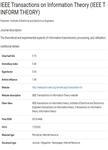版权所有:内蒙古大学图书馆 技术提供:维普资讯• 智图
内蒙古自治区呼和浩特市赛罕区大学西街235号 邮编: 010021

作者机构:Natl Univ Singapore Dept Comp Sci Singapore 117418 Singapore Natl Univ Singapore Dept Math Singapore 119076 Singapore
出 版 物:《IEEE TRANSACTIONS ON INFORMATION THEORY》 (IEEE信息论汇刊)
年 卷 期:2019年第65卷第6期
页 面:3646-3661页
核心收录:
学科分类:0808[工学-电气工程] 08[工学] 0701[理学-数学] 0812[工学-计算机科学与技术(可授工学、理学学位)]
主 题:Group testing sparsity information-theoretic limits adaptive algorithms
摘 要:The group testing problem consists of determining a small set of defective items from a larger set of items based on a number of possibly noisy tests, and is relevant in applications such as medical testing, communication protocols, pattern matching, and many more. One of the defining features of the group testing problem is the distinction between the non-adaptive and adaptive settings. In the non-adaptive case, all tests must be designed in advance, whereas in the adaptive case, each test can be designed based on the previous outcomes. While tight information-theoretic limits and near-optimal practical algorithms are known for the adaptive setting in the absence of noise, surprisingly little is known in the noisy adaptive setting. In this paper, we address this gap by providing information-theoretic achievability and converse bounds under various noise models, as well as a slightly weaker achievability bound for a computationally efficient variant. These bounds are shown to be tight or near-tight in a broad range of scaling regimes, particularly at low noise levels. The algorithms used for the achievability results have the notable feature of only using two or three stages of adaptivity.